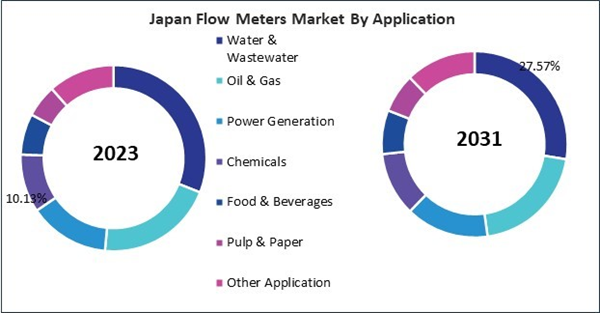In the power generation sector, flow meters play a pivotal role in monitoring and controlling the flow of steam, water, and other fluids. These meters are essential for maintaining efficiency in thermal, hydro, and nuclear power plants. Accurate flow measurement ensures optimal boiler performance, efficient cooling systems, and reduced energy waste. Technologies such as differential pressure, vortex, and magnetic flow meters are commonly deployed due to their ability to handle high temperatures and pressures. Thus, the Power Generation segment in China market consumed a volume of 57.59 Thousand Units in 2023.
The China market dominated the Asia Pacific Flow Meters Market by country in 2023, and is expected to continue to be a dominant market till 2031; thereby, achieving a market value of $1.39 billion by 2031. The Japan market is registering a CAGR of 6.9% during 2024-2031. Additionally, the India market is expected to showcase a CAGR of 8.4% during 2024-2031.
These meters are essential for maintaining precision and sterility in drug manufacturing, bioprocessing, and laboratory applications in the pharmaceutical industry. Mass and Coriolis flow meters are crucial in measuring drug ingredients, solvents, and purified water, ensuring compliance with GMP and FDA regulations. The prevalence of personalized medicine and biologics has resulted in an increase in the utilization of single-use flow meters, which enhance safety and prevent cross-contamination.
Furthermore, the utilization of these meters in heating, ventilation, and air conditioning (HVAC) systems has surged in response to the pursuit of energy efficiency by commercial buildings and industries. These meters aid in monitoring the flow of air and fluids, optimizing climate control, and reducing energy consumption. These meters are becoming integral to the renewable energy sector, particularly in applications such as hydropower and bioenergy. Precise fluid flow measurement is crucial for efficient renewable energy generation.
The demand for these meters in the Asia Pacific region is experiencing a substantial increase due to the expansion of the energy sector, accelerated industrialization, and urbanization, as well as the stricter enforcement of environmental regulations. China, the largest industrial hub in the Asia Pacific region, has a rising demand for these meters across multiple sectors, including manufacturing, petrochemicals, and water treatment. The Chinese government has implemented strict environmental regulations under its Five-Year Plan, compelling industries to adopt energy-efficient solutions and reduce emissions. This has resulted in a rise in the use of thermal mass and Coriolis flow meters in the chemical processing, refinery, and power facilities industries. Therefore, this market will expand across the Asia Pacific region in the coming years due to these factors.
List of Key Companies Profiled
- ABB Group
- Emerson Electric Co.
- General Electric Company
- Hitachi, Ltd.
- Honeywell International, Inc.
- Siemens AG
- Yokogawa Electric Corporation
- VSE Volumentechnik GmbH
- Hontzsch GmbH & Co. KG
- Krohne Group
Market Report Segmentation
By Application (Volume, Thousand Units, USD Billion, 2020-2031)- Water & Wastewater
- Magnetic
- Positive Displacement
- Turbine
- Vortex
- Coriolis
- Differential Pressure
- Ultrasonic
- Other Water & Wastewater
- Oil & Gas
- Magnetic
- Positive Displacement
- Turbine
- Vortex
- Coriolis
- Differential Pressure
- Ultrasonic
- Other Water & Wastewater
- Power Generation
- Magnetic
- Positive Displacement
- Turbine
- Vortex
- Coriolis
- Differential Pressure
- Ultrasonic
- Other Water & Wastewater
- Chemicals
- Magnetic
- Positive Displacement
- Turbine
- Vortex
- Coriolis
- Differential Pressure
- Ultrasonic
- Other Water & Wastewater
- Food & Beverages
- Magnetic
- Positive Displacement
- Turbine
- Vortex
- Coriolis
- Differential Pressure
- Ultrasonic
- Other Water & Wastewater
- Pulp & Paper
- Magnetic
- Positive Displacement
- Turbine
- Vortex
- Coriolis
- Differential Pressure
- Ultrasonic
- Other Water & Wastewater
- Other Application
- Magnetic
- Positive Displacement
- Turbine
- Vortex
- Coriolis
- Differential Pressure
- Ultrasonic
- Other Water & Wastewater
- Magnetic
- Positive Displacement
- Turbine
- Vortex
- Coriolis
- Differential Pressure
- Ultrasonic
- Other Water & Wastewater
- China
- Japan
- India
- South Korea
- Singapore
- Malaysia
- Rest of Asia Pacific
Table of Contents
Companies Mentioned
- ABB Group
- Emerson Electric Co.
- General Electric Company
- Hitachi, Ltd.
- Honeywell International, Inc.
- Siemens AG
- Yokogawa Electric Corporation
- VSE Volumentechnik GmbH
- Hontzsch GmbH & Co. KG
- Krohne Group








